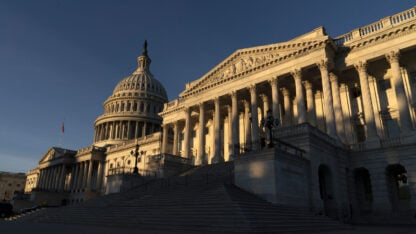WABE sent questions about environmental issues to all of the mayoral candidates. The questions cover climate change and extreme heat, water resources, park maintenance, the tree ordinance and lead contamination in West Atlanta neighborhoods.
The questions are in bold, and Sharon Gay‘s answers follow. Answers were edited for clarity.
Read answers from other candidates.
The U.S. Environmental Protection Agency recently expanded the area in English Avenue and Vine City where properties may need to have their soil completely removed and replaced, after finding dangerous levels of lead in people’s yards.
What role do you think the City of Atlanta should have in engaging with the community, and what is your plan to address this potential children’s health issue in West Atlanta neighborhoods?
Remediating the lead pollution in the soil of nearly 2,000 properties in the English Avenue and Vine City neighborhoods and closely related areas is a major, long-term and very costly undertaking. The U.S. EPA bears the responsibility for dealing with this major health problem and is proposing to include the area in the Superfund program’s National Priorities List (NPL), which would allow more federal funding for clean-up.
Although the City does not have a role in the cleaning process, it must play a positive role in the interaction between the scientists and technical people and the residents, some of whom have worried that this “lead problem” may be another effort to push residents out of the Westside.
As mayor I will develop a program of regular interaction with the affected neighborhoods involving the NPUs, neighborhood organizations and various non-profits involved in this process. In particular, we must address the vulnerability of children and help to facilitate regular testing and provide opportunities and the necessary facilities for recreation and related programs and activities that help keep children away from contaminated land.
While Atlanta has some big, beautiful new parks opening now and coming soon, many city parks need maintenance. According to the Park Department’s long-term planning program, Atlantans said the number one thing discouraging them from using their parks was that they were not well maintained.
How would you ensure that parks — whether they’re new or old, big or small, regardless of the neighborhood — get adequate funding and maintenance? And how would you involve communities in decisions about their parks?
Involving the communities associated with a particular park is the key step to determine how best to protect and improve the parks in question. As mayor, I would involve outside experts to perform a pro bono evaluation of our existing long-term park planning program. The long view is essential for adequately funding maintenance and necessary improvements. However, I will also work on a short-term planning and development program that includes the affected neighborhoods to determine what can be done as quickly as possible to bring the parks in question to a preliminary level of usefulness, attractiveness and safety.
Atlanta is losing its tree canopy, and the city has taken years to finish a promised re-write of the tree protection ordinance.
How would you make sure the ordinance update is completed, and ensure that it is enforced?
I am fully aware of the incredible contribution that Atlanta’s tree canopy brings to the quality of life in our city. I am also aware that our city has suffered from almost terminal procrastination when it comes to updating our tree ordinance. As mayor, the completion of a truly effective and tree-respecting ordinance will be one of my key priorities and I will use the full authority of the mayor’s office to fulfill that purpose.
Atlanta is hot and getting hotter. Often the hottest neighborhoods are in vulnerable communities of color. Atlanta also has many households with high energy burdens that pay a high proportion of their income to energy bills. Not everyone can afford to run the air conditioner all summer or afford efficiency upgrades to keep their homes cooler — and heat can be dangerous.
What role do you see for the mayor’s office in addressing the health risks of extreme heat?
As mayor, I will have an office of community affairs that will be the central point to interact with constituents in need of special assistance. I will also seek support from the private utilities to join the city, not just in meeting emergencies, but also in developing new or expanded existing programs to provide assistance to citizens in times of weather-related stress.
To address climate change, the City of Atlanta prepared a climate action plan in 2015 on how to cut emissions. The city also made a commitment to achieve 100% clean energy by 2035. But progress towards that goal has been slow.
What, if anything, would you do to keep Atlanta moving towards emissions reductions? And how would you prepare Atlanta communities to weather the effects of climate change, which include extreme heat, increased flooding, mosquito-borne disease and worsening air quality?
Our way of life is now threatened more than ever by the consequences of climate change: endless fires, hurricanes, tornados, rising sea levels, dropping reservoir and aquifer levels, increased heat-related health effects, loss of habitat, crop failure, long-cycle droughts and greater risk than ever to our food production systems.
Realistically, there are clear limits to what the city can do to deal with climate issues. Nevertheless, as mayor, I would start a program to identify and evaluate the large number of cars and trucks that the city uses daily so that we have a vehicle fleet that ensures our ability to meet our daily responsibilities efficiently, and no more. In addition, I would seek ways to move toward electric vehicles in all categories as quickly as possible. That, of course, would have a significant impact on the city budget so money would have to be a central consideration of any such transformational program.
Regarding our building code enforcement, I would update the training of our City Building Code and Plan review staff to ensure that new buildings meet the minimum 2020 Georgia Energy Code required by state law.
Finally, among other things, I would promote “Solarize Atlanta” programs to promote solar-ready home and business construction while seeking to make solar energy more affordable to low-income families.
Georgia won a major legal victory in the water wars in the U.S. Supreme Court earlier this year, but there is still another case ongoing. And, Florida, Georgia and Alabama have not found a resolution between themselves. Metro Atlanta is subjected to both floods and droughts — both of which climate change will likely worsen — and we must share our limited water supply within the region and with downstream neighbors.
As the mayor of Atlanta, how would you see your role in addressing and preparing for the region’s water challenges?
Our region’s and our city’s water-related issues are connected. One central issue for us, however, is some left-over complications from the old combined sewers and for the accumulation of rain that at times adds large volumes of water to our sewer system in a short time.
The fact that the number of people in our city doubles every working day, and even more so when our conventions are in full swing, adds to the pressures on our water and sewer systems.
Atlanta is under a consent decree which obligates us to meet certain standards required by the EPA’s Office of Inspector General. We have spent around $2 billion so far and will have five years to complete the improvements imposed by the federal government when the new mayor takes office in January 2022.
Atlanta has made some significant progress with these two environmental issues. However, it is hard to understand why the city’s Watershed Management department claims from time to time that it continues to review the initial report by the Office of Inspector General.
This is an issue of great importance to our city and our metro region (hence also to our state). A first order of business for my mayoral administration will be to order a full and detailed report from our Water Management department and to seek a clear path to meet all the requirements of the consent order by the 2027 deadline.
Read answers from other candidates.








